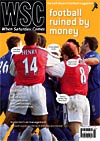 After over 120 years East Stirlingshire FC could be no more if a proposed move goes through. Ken Gall reflects on a club with a rich history and their fight to survive
After over 120 years East Stirlingshire FC could be no more if a proposed move goes through. Ken Gall reflects on a club with a rich history and their fight to survive
Even the kindest of souls would have to acknowledge that East Stirlingshire FC have not been one of the major players in Scottish football history. Winners of precisely no major honours and with a grand total of no cup final appearances, even their apparently geographically specific name tends to leave fans scratching their heads as to the club’s location (“near Falkirk” is the best most can come up with).
But all those who confuse East Stirling with East Fife (or Stirling Albion) would do well to take heed of the name in the coming months, because, if chairman Alan Mackin has his way, it will disappear entirely after more than 120 years. And while this may not prompt the national press to clear their pages for a “Save Shire” campaign, it could mark another big step in the battle between Scottish football’s romantic tendency and the harsh idealists.
The component parts of the story seem familiar. Having acquired a majority shareholding in the club, Mackin and his fellow directors now propose to sell Shire’s Firs Park home (located, fortuitously, in prime central belt development land) and move the club a few miles to the new town of Grangemouth, where (again fortuitously) an athletics stadium is deemed to be suitable for redevelopment. The club would adopt the name of its new home town, and all traces of East Stirlingshire FC would cease to exist by 2003.
On the face of it, it is hard to argue with Mackin’s assertion that Shire’s attempts to compete with the more popular Falkirk FC are “a waste of time”. Crowds (a loose description) rarely number above 400, and the average weekly wage for Shire’s first-teamers is £35. “A move to Grangemouth would let us tap into a town that doesn’t have a senior club,” Mackin points out, arguing it would allow opportunities for greater community development.
Clearly, Mackin’s template is Livingston FC. Eight years ago, businessman Bill Hunter gained control of Meadowbank Thistle, whose aim of becoming Edinburgh’s third club had proved even more futile than Shire’s attempts to rival Falkirk. Despite the vehement opposition of a couple of hundred Thistle diehards, the move to the Lothian new town proceeded.
This year, if their form holds, Livingston will qualify for the UEFA Cup, a frankly phenomenal achievement that would seem to vindicate Hunter’s decision to move the club. So what is there to stop Mackin and his proposed Grangemouth FC from doing the same thing?
The difference may lie in the attitude of the clubs’ respective boards. Soon after their move, Livingston were taken over by an extremely amibitious group, including former Celtic director Dominic Keane, who invested heavily in players and infrastrucuture. Mackin and his associates have already announced that part of the money from the sale of Firs Park will be spent on upgrading Grangemouth stadium. The remainder – potentially a six-figure sum – will be paid out as dividends to the shareholders, that is, themselves.
Indeed, with admirable frankness, Mackin has stated that the shareholders – apparently including members of his own family – do not want that money to be reinvested because “we realise that football clubs lose money as a business”. Let us be clear – there is nothing illegal in any of this. In fact, a strong case can be made that Mackin’s idea is the only chance for a near-moribund club to make any kind of progress. And there has been little sign of any mass local protest from the few individuals who could call themselves fans of East Stirling.
The only dissenters would appear to be those romantics who want all football clubs to survive in perpetuity, regardless of their circumstances, and who see men such as Mackin as callous and hard-hearted capitalists, ready to wipe away history in the search for a dollar. The problem is that too few of these are local people, most of whom will barely linger over reports of the possible demise of their hometown club, preferring instead to turn to the latest Old Firm inanities.
Whether this is a bad thing depends, of course, on one’s point of view. But either way, it seems unlikely Shire will be the last small Scottish club to be faced with the dilemma.
From WSC 181 March 2002. What was happening this month